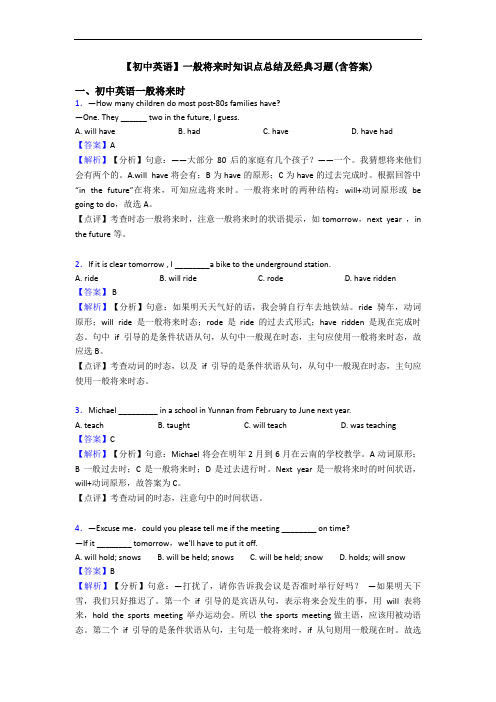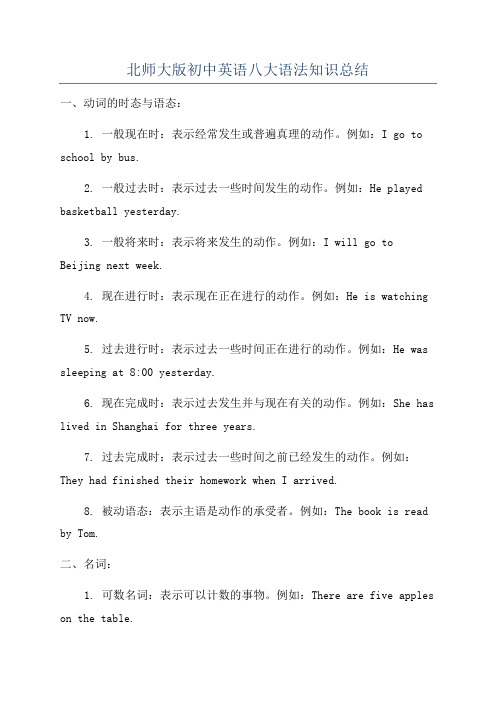北师大版初中英语七年级下册知识讲解-Unit 4 —— 一般将来时
英语语法:解析初中英语一般将来时

最牛英语口语培训模式:躺在家里练口语,全程外教一对一,三个月畅谈无阻!洛基英语,免费体验全部在线一对一课程:/(报名网址)英语语法:解析初中英语一般将来时一般将来时主要用来描述将要发生的动作或存在于未来的情况。
这里所说的“将来时间”是指“说话、写文章那一刻以后的时间”。
它的表示方法主要有如下几种:1)shall / will + 动词原形这种表示方法是说,动作在现在或目前还未发生,要在将来的某个时间内发生;它没有主观性,是“纯粹的将来动作”。
例如:I shall / will not be free tomorrow .我明天没空。
He will arrive here this evening .他今晚抵达这里。
2) be( am / is / are ) + going +不定式这种表示方法主要是说明A)“说话人的意图、打算”;B)“某种可能性”。
例如:A) He is going to spend his holidays in London . 他打算在伦敦度假。
Who is going to speak first? 谁先发言?B) It is going to rain soon .马上要下雨了。
Is he going to collect any data for us? 他会帮我们收集资料吗?If you go to New Zealand, you are going to like the place. 如果你去新西兰,你会喜欢上那个地方的。
3) be( am / is / are ) + 不定式表示方法描述两钟情况:按计划安排要发生的动作,这个动作发生的时间一般不会很远;要求或命令他人做某事。
洛基英语是中国英语培训市场上的一朵奇葩,是全球已被验证的东方人英语学习的最佳模式。
洛基英例如:A) The new bridge is to open to traffic in three days. 新桥三天后通车。
【初中英语】一般将来时知识点总结及经典习题(含答案)

【初中英语】一般将来时知识点总结及经典习题(含答案)一、初中英语一般将来时1.—How many children do most post-80s families have?—One. They ______ two in the future, I guess.A. will haveB. hadC. haveD. have had【答案】A【解析】【分析】句意:——大部分80后的家庭有几个孩子?——一个。
我猜想将来他们会有两个的。
A.will have将会有;B为have的原形;C为have的过去完成时。
根据回答中“in the future”在将来,可知应选将来时。
一般将来时的两种结构:will+动词原形或be going to do,故选A。
【点评】考查时态一般将来时,注意一般将来时的状语提示,如tomorrow,next year ,in the future等。
2.If it is clear tomorrow , I ________a bike to the underground station.A. rideB. will rideC. rodeD. have ridden【答案】 B【解析】【分析】句意:如果明天天气好的话,我会骑自行车去地铁站。
ride骑车,动词原形;will ride是一般将来时态;rode是ride的过去式形式;have ridden是现在完成时态。
句中if引导的是条件状语从句,从句中一般现在时态,主句应使用一般将来时态,故应选B。
【点评】考查动词的时态,以及if引导的是条件状语从句,从句中一般现在时态,主句应使用一般将来时态。
3.Michael _________ in a school in Yunnan from February to June next year.A. teachB. taughtC. will teachD. was teaching【答案】C【解析】【分析】句意:Michael将会在明年2月到6月在云南的学校教学。
北师大版七年级英语下册Unit 4 Lesson 11第2课时教学课件(共22张PPT)

will + 动词原形
you will, he/she/it will, we will, they will )
I will go shopping.
will be +形容词 will not = won’t
It will be sunny and warm.
表示将来的时间:tomorrow, next week/ month/year, the day after tomorrow, in the future, this Sunday, in five days
New York will be a cloudy day on Saturday.
根据下面的图片,利用你的想象小 组讨论一下,将要发生什么事情呢?
He will….
根据上面的图片内容写一篇小短文, 必须有一般将来时肯定句和否定句。
不习惯读书进修的人,常会自满于现状,觉得再没有什么事情需要学习,于是他们不进则退。经验丰富的人读书用两只眼睛,一只眼睛看到纸面上的话,另 一眼睛看到纸的背面。2022年3月31日星期四2022/3/312022/3/312022/3/31 书籍是屹立在时间的汪洋大海中的灯塔。2022年3月2022/3/312022/3/312022/3/313/31/2022 正确的略读可使人用很少的时间接触大量的文献,并挑选出有意义的部分。2022/3/312022/3/31March 31, 2022 书籍是屹立在时间的汪洋大海中的灯塔。
Yes, I will. No, I won’t.
swim tomorrow evening
He will drive to the park next week. He will not (won’t) drive to the park next week. Will he drive to the park next week?
北师大版七年级英语下册Unit 4 Lesson 11第2课时教学课件(共22张PPT)

根据下面的图片,利用你的想象小 组讨论一下,将要发生什么事情呢?
He will….
根据上面的图片内容写一篇小短文, 必须有一般将来时肯定句和否定句。
watch TV on Saturday He will watch TV on Saturday. He will not watch TV on Saturday. Will he watch TV on Saturday? Yes ,he will. No ,he won’t.
It will be green.
will be +形容词
It will turn cloudy in the afternoon. You will see lots of sun .
will + do(动词原形)
一般将来时表示将要发生的事,或者将来某一段时间
内经常进行的动作或者状态 will 没有人称和数的变化(I will,
play the computer this weekend
She will do her homework tomorrow evening. She will not do her homework tomorrow evening. Will she do her homework tomorrow evening?
2. tomorrow ,sunny ,Sydney
Sydney will be sunny tomorrow.
3. rain ,London ,tomorrow night
London will be rain tomorrow night.
2024年中考英语语法复习—一般将来时课件

2)用在由when,if等引导的时间状语从句和 条件状语从句中,表示将来的动作。
If it doesn’t rain tomorrow,we will go hiking. 如果明天不下雨,我们将去远足。
★一般将来时经常会伴随一些时间状语,比较常见的有:
tomorrow
soon
next week下周
练习
1 . There ________ a sports meet next week if it
________.
A.is going to have; doesn’t rain
B.is going to be; doesn’t rain
C.is going to be; won’t rain D.is going to have; won’t rain
Will you go there? 你要去那儿吗?
“Shall I...?”“Shall we...?”常用来征求对方意见。“Will you...?”表示客气的邀请或请求。
Will you please open the window? 请你把窗打开,好吗?
3.否定句:在will/shall后加not,可缩写成 won’t/shan’t 陈述句:I will go there./I shall go there. 我要去那儿。
to +
+其他
not,即主语+be not going
I am not going to watch the video. 我不准备去看录像。
3)一般疑问句:将be
Is he going to see a doctor? 他准备去看医生吗?
4)含有be goi to+动词原形+其他
七年级英语下册知识导学Module4Lifeinthefuture一般将来时词句精讲精练新版外研版

Module 4 —一般将来时【概念引入】一般将来时表示将来某个时间要发生的动作或存在的状态,将来经常或反复发生的动作,常与表示将来的时间状语连用。
如:tomorrow , tomorrow morning / afternoon …,the day after tomorrow , next year , next month … , from now on (从现在开始),in an hour (一小时后),in two days / weeks …等。
例如:What are you going to do next Sunday ?下周日你打算做什么?The American basketball team will arrive in Beijing tomorrow.美国篮球队明天要到北京。
【语法讲解】1. be going to+动词原形结构(1)表示主体现在的意图,即打算在最近或将来要做某事,主语通常指人。
在被动结构中,主语也可指物,但动作的执行者仍然是人。
例如:We are going to have a class meeting this afternoon. 今天下午我们打算开班会。
She’s going to be a teacher. 她打算作一名教师。
The wall is going to be brushed white. 墙要被刷成白色的。
(2)表示主观判断客观上要发生的事,或根据目前的迹象或预测很可能要发生的事。
例如:Look at the black clouds. It’s going to rain. 看那些乌云,快要下雨了。
Don’t go out. It is going to rain. 不要出去,要下雨了。
(3) there be句型可以与be going to 结构连用。
例如:There is going to be a football match on TV this evening.今晚电视上有一场足球比赛。
北师大版初中英语八大语法知识总结

北师大版初中英语八大语法知识总结一、动词的时态与语态:1. 一般现在时:表示经常发生或普遍真理的动作。
例如:I go to school by bus.2. 一般过去时:表示过去一些时间发生的动作。
例如:He played basketball yesterday.3. 一般将来时:表示将来发生的动作。
例如:I will go toBeijing next week.4. 现在进行时:表示现在正在进行的动作。
例如:He is watching TV now.5. 过去进行时:表示过去一些时间正在进行的动作。
例如:He was sleeping at 8:00 yesterday.6. 现在完成时:表示过去发生并与现在有关的动作。
例如:She has lived in Shanghai for three years.7. 过去完成时:表示过去一些时间之前已经发生的动作。
例如:They had finished their homework when I arrived.8. 被动语态:表示主语是动作的承受者。
例如:The book is read by Tom.二、名词:1. 可数名词:表示可以计数的事物。
例如:There are five apples on the table.2. 不可数名词:表示无法计数的事物。
例如:She has a lot of homework to do.3. 复数形式:表示两个或两个以上的事物。
例如:I have two brothers.4. 特殊名词:不规则变化形式的名词。
例如:man — men, child — children.三、形容词与副词:1. 形容词:修饰名词,表示事物的性质、特征等。
例如:It is a beautiful flower.2. 副词:修饰动词、形容词等,表示动作或状态的方式、程度等。
例如:He speaks English fluently.四、动词:1.动词的时态与语态:参考第一点的内容。
初中英语--一般将来时

一般将来时一般将来时am/is/are/going to + do和will/shall + do1) shall用于第三人称单数,常被will 所代替,二者都可以缩写成'll。
will 在陈述句中用于各人称,在征求意见时常用于第二人称。
Which paragraph shall I read first.Will you be at home at seven this evening?2) be going to +动词原形\地点,表示将来。
a. 主语的意图,即将做某事。
What are you going to do tomorrow?b. 计划,安排要发生的事。
The play is going to be produced next month。
c. 有迹象要发生的事Look at the dark clouds, there is going to be a storm.3) be +不定式表将来,按计划或正式安排将发生的事。
We are to discuss the report next Saturday.4) be about to +不定式,意为马上做某事。
He is about to leave for Beijing.注意:be about to 不能与tomorrow, next week 等表示明确将来时的时间状语连用。
一般将来时1.一般将来时的基本概念一般将来时表示将来某一时刻的动作或状态,或将来某一段时间内经常的动作或状态。
一般将来时由助动词shall(第一人称),will(第二、三人称)+动词原形构成。
美国英语则不管什么人称,一律用will。
2.一般将来时的形式●will 常简略为'll,并与主语连写在一起,如:I'll,he'll,it'll,we'll,you'll,they'll。
●一般疑问句如用will you…?其简略答语须是Yes,I will或No,I will not;如用Shall you…?(较少见)其简略答语须是Yes,I shall.或No,I shall not.。
- 1、下载文档前请自行甄别文档内容的完整性,平台不提供额外的编辑、内容补充、找答案等附加服务。
- 2、"仅部分预览"的文档,不可在线预览部分如存在完整性等问题,可反馈申请退款(可完整预览的文档不适用该条件!)。
- 3、如文档侵犯您的权益,请联系客服反馈,我们会尽快为您处理(人工客服工作时间:9:00-18:30)。
一般将来时
编辑:
【概念引入】
一般将来时表示将来某个时间要发生的动作或存在的状态,将来经常或反复发生的动作,常与表示将来的时间状语连用。
如:tomorrow , tomorrow morning / afternoon …, the day after tomorrow , next year , next month … , from now on (从现在开始),in an hour (一小时后),in two days / weeks …等。
例如:What are you going to do next Sunday ?
下周日你打算做什么?
The American basketball team will arrive in Beijing tomorrow.
美国篮球队明天要到北京。
【语法讲解】
1. be going to+动词原形结构
(1)表示主体现在的意图,即打算在最近或将来要做某事,主语通常指人。
在被动结构中,主语也可指物,但动作的执行者仍然是人。
例如:
We are going to have a class meeting this afternoon. 今天下午我们打算开班会。
She’s going to be a teacher. 她打算作一名教师。
The wall is going to be brushed white. 墙要被刷成白色的。
(2)表示主观判断客观上要发生的事,或根据目前的迹象或预测很可能要发生的事。
例如:Look at the black clouds. It’s going to rain. 看那些乌云,快要下雨了。
Don’t go out. It is going to rain. 不要出去,要下雨了。
(3) there be句型可以与be going to 结构连用。
例如:
There is going to be a football match on TV this evening.
今晚电视上有一场足球比赛。
Is there going to be a class meeting this Friday afternoon?
这个周五有班会吗?
2. be going to 在肯定句中的形式
be going to 结构中的助动词be很少用原形,be随主语人称和数的变化而变化,它一般有三种形式:am , is, are。
而going to固定不变。
即:当主语是I 时用am;当主语是第三人称单数时用is;当主语是其他人称时用are。
I am going to buy something tomorrow morning. 明天早上我要去买些东西。
She is going to see Mr. Wang this afternoon. 她打算今天下午去看望王先生。
3. 含be going to 的句子变否定句和一般疑问句的变法
由于句子中有助动词be,因此be going to的否定句和一般疑问句的构成很容易,即在be (am, is, are) 的后面加上not 就构成了否定句;把be (am, is, are) 放到句首,在句末加问号就构成了一般疑问句,其答语为:Yes, 主语+ am/is/are. / No, 主语+ isn’t/aren’t. / No, I’m not.不过I am...在改为一般疑问句时常常改为“Are you ...?”。
例如:They are going to see the car factory next week. (肯定句)
They are not going to see the car factory next week. (否定句)
—Are they going to see the car factory next week?
—Yes, they are. (No, they aren't.) (一般疑问句及其回答)
4. will / shall+动词原形
表示将来的动作或状态,常伴有表示将来的时间状语。
shall用于第一人称,will用于第二、三人称,但在现代英语中will可以通用于各种人称。
在问句中shall常用于第一人称表示建议或征求对方意见。
例如:
I will go to my hometown next week . 我下周将去我的家乡。
Shall we go to the park ? 我们去公园好吗?
(1) 肯定句:主语+ will / shall +动词原形+(宾语)+其他成分。
例如:
People will have robots in their homes. 人们家里会有机器人。
(2) 否定句:主语+ will / shall + not + 动词原形+(宾语)+其他成分,其中,will not = won’t/ shall not
=shan’t。
例如:
People won’t have robots in their homes. 人们家里不会有机器人。
(3) 一般疑问句:把will / shall 提到句子主语之前,结尾变问号。
Will people have robots in their homes? 人们家里会有机器人吗?
(4) 特殊疑问句:特殊疑问词+ will +主语+ 动词原形+ 其他成分?
When will people have robots in their homes? 人们家里什么时候会有机器人?
【注意】
在问对方是否愿意, 或表示客气的邀请时,常用will。
在表示建议或征求对方意见时,用shall。
例如:Will you please open the door? 请打开门好吗?
Shall we go at ten? 我们在10 00走好吗?
5. be going to与will 的区别:
(1) be going to 表示近期、眼下就要发生的事情,will 表示的将来时间则较远一些。
例如:
He is going to write a letter tonight. 今晚他打算写一封信。
He will write a book one day. 有一天他会写一本书。
(2) be going to 表示根据主观判断将来肯定发生的事情,will表示客观上将来势必发生的事情。
例如:
I think our team is going to win the game. 我认为我们队会赢得比赛。
He will be twenty years old next year. 明年他就20岁了。
(3) be going to含有“计划,准备”的意思,而will则没有这个意思。
例如:
I’m going to spend my holiday in a village. 我打算在一个小村子里度假。
He will be here in half an hour. 他半小时后到达这里。
(4) 在有条件从句的主句中,一般不用be going to, 而多用will。
例如:
We’ll have a picnic if my father is free. 如果我父亲有空,我们会去野餐。
(5) be going to 表示根据目前迹象推断将要发生的事情,而在没有迹象表明的情况下进行的猜测用“will
和be going to”皆可。
例如:
Look at the clouds. It’s going to rain. 你看天上的云。
快下雨了。
My God! We are going to crash. 天哪!我们快撞车了。
I think the weather will be nice. =I think the weather is going to be nice.
我想天会晴朗。
